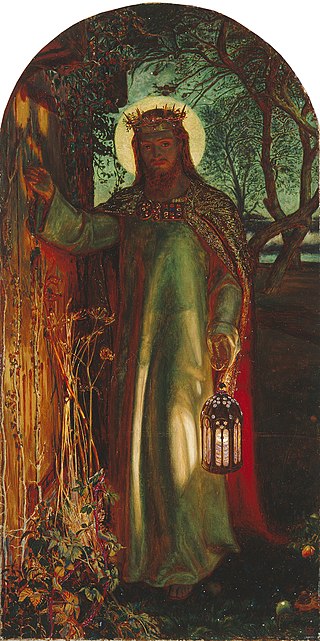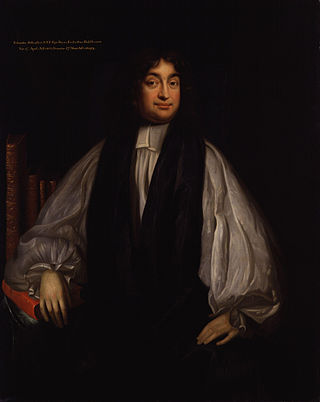Related Research Articles

George Fox was an English Dissenter, who was a founder of the Religious Society of Friends, commonly known as the Quakers or Friends. The son of a Leicestershire weaver, he lived in times of social upheaval and war. He rebelled against the religious and political authorities by proposing an unusual, uncompromising approach to the Christian faith. He travelled throughout Britain as a dissenting preacher, performed hundreds of healings, and was often persecuted by the disapproving authorities. In 1669, he married Margaret Fell, widow of a wealthy supporter, Thomas Fell; she was a leading Friend. His ministry expanded and he made tours of North America and the Low Countries. He was arrested and jailed numerous times for his beliefs. He spent his final decade working in London to organise the expanding Quaker movement. Despite disdain from some Anglicans and Puritans, he was viewed with respect by the Quaker convert William Penn and the Lord Protector, Oliver Cromwell.

John Wesley was an English cleric, theologian, and evangelist who was a leader of a revival movement within the Church of England known as Methodism. The societies he founded became the dominant form of the independent Methodist movement that continues to this day.

Robert Barclay was a Scottish Quaker, one of the most eminent writers belonging to the Religious Society of Friends and a member of the Clan Barclay. He was a son of Col. David Barclay, Laird of Urie, and his wife, Lady Katherine Barclay. Although he himself never lived there, Barclay was titular governor of the East Jersey colony in North America through most of the 1680s.

Inward light, Light of God, Light of Christ, Christ within, That of God, Spirit of God within us, Light within, and inner light are related phrases commonly used within the Religious Society of Friends (Quakers) as metaphors for Christ's light shining on or in them. It was propagated by the founder of the Quaker movement, George Fox, who "preached faith in and reliance on 'inward light' ". The first Quakers were known to sit in silence and meditate on the words of the Bible until they felt the inward light of God shining upon them and the Holy Spirit speaking. The concept was highly important to early Quakers, who taught: "God reveals Himself within each individual's conscience and consciousness by the Holy Spirit, Christ Himself being the Light to illuminate man's sinfulness and lead in the way of truth and righteousness. ... this light is in all men by the grace of God to lead them to Christ, and that the same light will give daily guidance to the Christian."

The Public Universal Friend was an American preacher born in Cumberland, Rhode Island, to Quaker parents. After suffering a severe illness in 1776, the Friend claimed to have died and been reanimated as a genderless evangelist named the Public Universal Friend, and afterward shunned both their birth name and gendered pronouns. In androgynous clothes, the Friend preached throughout the northeastern United States, attracting many followers who became the Society of Universal Friends.

Margaret Fell or Margaret Fox was a founder of the Religious Society of Friends. Known popularly as the "mother of Quakerism," she is considered one of the Valiant Sixty early Quaker preachers and missionaries. Her daughters Isabel (Fell) Yeamans and Sarah Fell were also leading Quakers.

Edward Stillingfleet was a British Christian theologian and scholar. Considered an outstanding preacher as well as a strong polemical writer defending Anglicanism, Stillingfleet was known as "the beauty of holiness" for his good looks in the pulpit, and was called by John Hough "the ablest man of his time".

Anne Conway was an English philosopher of the Enlightenment, whose work, in the tradition of the Cambridge Platonists, was an influence on Gottfried Leibniz. Conway's thought is a deeply original form of rationalist philosophy, with hallmarks of gynocentric concerns and patterns that lead some to think of it as unique among seventeenth-century systems. Hugh Trevor-Roper called her "England's greatest female philosopher."

Quaker views on women have always been considered progressive in their own time, and in the late 19th century this tendency bore fruit in the prominence of Quaker women in the American women's rights movement.
Elizabeth Hooton was an English Dissenter and one of the earliest preachers in the Religious Society of Friends, also known as the Quakers. She was born in Nottingham, England. She was beaten and imprisoned for propagating her beliefs; she was the first woman to become a Quaker minister. She is considered one of the Valiant Sixty, a group of celebrated Friends preachers. Her surname is sometimes spelled Hooten.
William Dewsbury was an English Quaker minister and religious writer in the early period of the movement. He was born in Allerthorpe, Yorkshire, around 1621. Little is known of his parents or education, except that his father died when he was eight years old.

Thomas Comber (1645–1699) was an English churchman, Dean of Durham from 1689.
Thomas Grantham (1634–1692) was an English General Baptist minister, and theologian. He had access to Charles II of England, and made petitions on behalf of Baptist beliefs.
Katherine Evans (1618–1692) and Sarah Cheevers (1608–1664) were English Quaker activists who were held captive during the Roman Inquisition in Malta, between December 1658 and August 1663. During and after their captivity, Evans and Cheevers published several books that were critical of the Catholic Church and the Inquisition and promoted their own Quaker beliefs.
HesterBiddle was an English Quaker writer and itinerant preacher who "addressed pugnacious pamphlets to those who persecuted religious dissenters, worshipped in the Anglican church, or refused to help the poor." She became a Quaker in 1654. Her subsequent preaching took her to Ireland and Scotland, Newfoundland, the Netherlands, Barbados, Alexandria and France.
Sarah Blackborow was the English author of religious tracts, which strongly influenced Quaker thinking on social problems and the theological position of women. She was one of several prominent female activists in the early decades of the Society of Friends, notable also for originating a scheme to distribute aid to London prisoners.

Sarah Fell (1642–1714) was an English Quaker accountant and writer at Swarthmore Hall. She was the daughter of Margaret Fell and Thomas Fell, and the eventual stepdaughter of George Fox.
Anne Docwra born Anne Waldegrave was a Quaker minister, religious writer and philanthropist.
Theophila Townsend was a Quaker writer, preacher, and activist from Cirencester, Gloucestershire, England.
Tace Sowle, later Tace Sowle Raylton (1666–1749) was a London-based printer and a major publisher of early Quaker writings.
References
- 1 2 Van Vleck Garman, Mary (2015). Angell, Stephen W.; Dandelion, Pink (eds.). Early Quakers and their Theological Thought 1647-1723. Cambridge: Cambridge University Press. pp. 224–238.
- 1 2 "Elizabeth Bathurst: Overview". Orlando: Women's Writing in the British Isles from the Beginnings to the Present. Archived from the original on 2022-02-18. Retrieved 2022-02-18.
- 1 2 Apetrei, Sarah (2009). "The Universal Principle of Grace: Feminism and Anti-Calvinism in Two Seventeenth-Century Women Writers". Gender & History. 21: 130–146. doi:10.1111/j.1468-0424.2009.01538.x. S2CID 144139379.
- 1 2 3 Bathurst, Elizabeth (1691). Truth Vindicated... London: Sowle Press.
- ↑ Nakano, Yasuharo (2008). "Elizabeth Bathurst's Soteriology and a List of Corrections in Several Editions of her Works". Quaker Studies. 13: 89–102. doi: 10.3828/quaker.13.1.89 .
- ↑ Mack, Phyllis (1992). Visionary Women: Ecstatic Prophecy in Seventeenth-Century England. Berkeley: University of California Press. p. 312.
- ↑ Bathurst, Elizabeth (1680). The sayings of women, which were spoken upon sundry occasions, in several places of the Scriptures. Sowle Press.